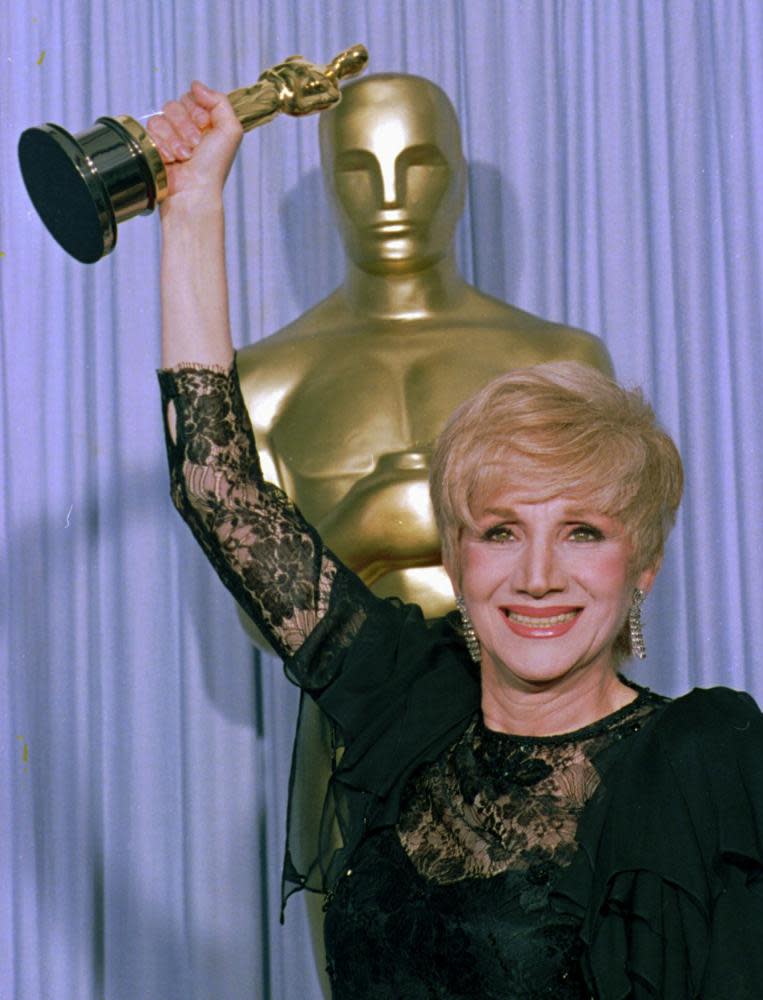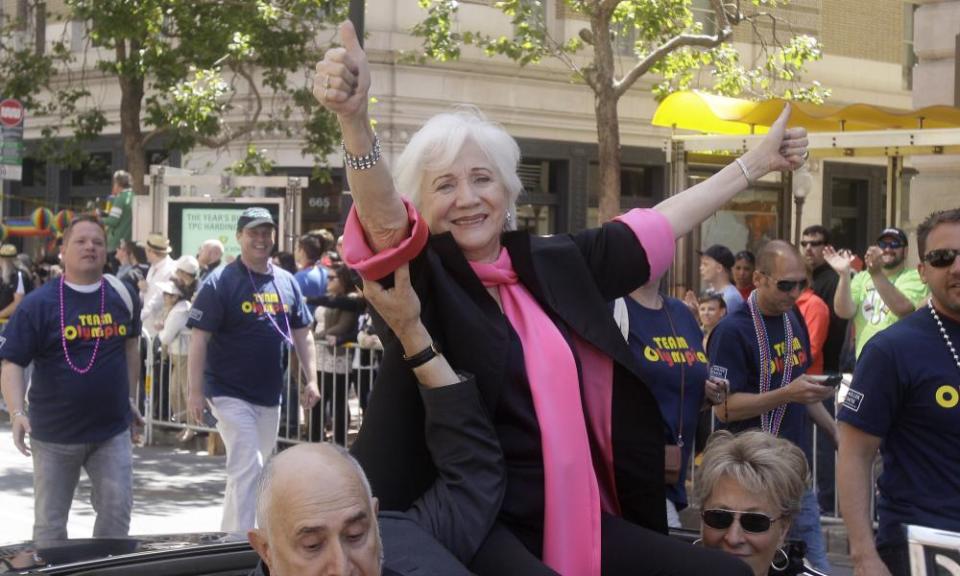Oscar-winning actor Olympia Dukakis, star of Moonstruck, dies aged 89

Olympia Dukakis, the Oscar-winning actor whose hit films included Moonstruck and Steel Magnolias, has died. She was 89.
Related: Olympia Dukakis: 'My character is described as a foul-mouthed lesbian Walther Matthau? I love that!'
Dukakis’s brother, Apollo Dukakis, announced the news on Facebook on Saturday, writing that “after many months of failing health” his “beloved sister, Olympia Dukakis, passed away this morning in New York City”.
Dukakis won an Oscar for best supporting actor for Moonstruck, a 1987 romantic comedy in which she played the mother of the lead character played by Cher opposite Nicolas Cage. Other films included Look Who’s Talking and its sequel, Working Girl and Mr Holland’s Opus.
In an extensive television career Dukakis appeared as Anna Madrigal, a transgender San Francisco landlord, in series based on Armistead Maupin’s Tales of the City. She also appeared in the stoner comedy Bored to Death, in which her character had an affair with the character played by Zach Galifianakis.
“I always played older,” she told the New York Times in 2004. “I think it was the voice.”
Among tributes on Saturday, Cher tweeted: “Olympia Dukakis was an amazing, Academy Award-winning actress. Olympia played my mom in Moonstruck and even though her part was that of a suffering wife … all the time she would tell me how much she loved Louis, her ‘handsome talented husband’. I talked to her three weeks ago. Rip dear one.”
The Star Trek actor George Takei wrote: “We were Moonstruck by her, as she told us great Tales of the City. A true Steel Magnolia within a more common forest. Ah, what a life force, her later years her best. Rest now among the heavens, Olympia.”

Dukakis had an extensive stage career and married Louis Zorich, also an actor, in 1962. They had three children.
They appeared together once, in a production of Who’s Afraid of Virginia Woolf by Edward Albee for the theatre company they founded in Montclair, New Jersey in 1979. On Zorich’s death in 2018, aged 93, the Times quoted a 1991 interview in which he said the couple got so into their roles as a warring couple they “almost got divorced”.
On Saturday, Apollo Dukakis wrote that his sister was “finally at peace and with her Louis”.
Born in Lowell, Massachusetts, in 1931, Olympia Dukakis was a cousin of Michael Dukakis, who became governor and the Democratic nominee for president in 1988. Collecting her Oscar that year, she held the award over her head and called: “OK, Michael, let’s go!” Both referred to ‘88 as the “year of the Dukakii” but he lost conclusively to the Republican, George HW Bush.
In 1989, Dukakis’s Oscar statuette was stolen from her home in New Jersey home.
“We’re not pretentious,” Zorich said. “We kept the Oscar in the kitchen.”
In 2012, Dukakis told the Guardian she felt her Greek ancestry meant she “was an outsider and that I never quite fit in – both in relation to Greek culture and mainstream US culture. Growing up, I was always kind of torn between those two worlds, never quite according enough respect to either one. But that’s OK.”
In an in-depth interview in 2001, she told the same paper that growing up, “we fought the Armenians, we fought the Irish, we fought the French, they fought us. We were just eight or nine and we’d call each other greaseball, Mick, wop and so on. And of course we’d make fun of each other’s names.”
Describing Zorich’s near-death in a car crash in 1977, she said: “The casting people knew what had happened, and they would call up and give me two or three days in movies. People were very kind because they knew that we were [struggling]. I remember thinking, ‘It’s too hard. I wanna stop, I just wanna stop.’”
But acting proved too much of a draw – and “the only thing I could make a living at”.
“The process is endlessly interesting,” Dukakis said. “How you change as you work and as you get older. You somehow get to know more about who you are and what you are and why you are.”
Success, she said, was sometimes hard to manage.
“I had a difficult time with it. People said to me, ‘Oh, you’ve paid your dues.’ But so had a lot of people. And what about all those incredible plays I was in? To make a fuss about the Oscar felt like a betrayal.
“Finally it occurred to me: maybe good fortune comes to you for the same reason as bad. It’s all about understanding more: you learn a lot of things when you’re struggling, and other things when you’re what the world calls successful. Or perhaps it’s just something that happens. Some days it’s cold and some days it hot.”

In the 2012 interview, Dukakis discussed her status as a gay icon, in large part thanks to the role of Anna Madrigal.
“I appreciate that my work is seen and understood and feels relevant to people,” she said. “And I’m lucky enough to have friends of all different sexual persuasions, some of which are utterly inexplicable to me. So it’s all good.
“Last year I was grand marshal at the San Francisco gay parade, and that was good too. You get to ride around in a car and wave at people: that’s about it. My arm got so tired from the waving that my brother had to hold it up for me.”

 Yahoo Movies
Yahoo Movies 
